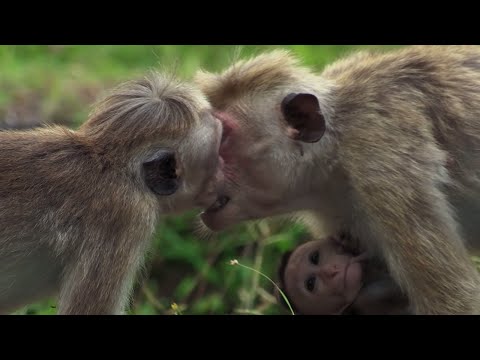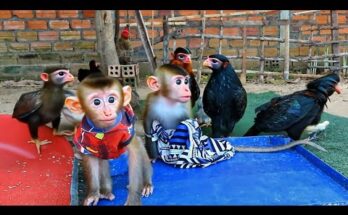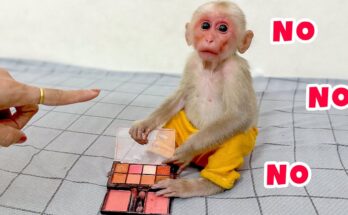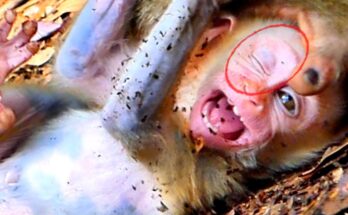
Bobo had recently turned two months old. His face was still round and soft, his eyes full of wonder and innocence. He clung tightly to his mother’s fur as they moved through the treetops. Though small, Bobo was full of energy—curious about everything and eager to explore the world around him. But his innocence made him an easy target.
The troop was large and complex, filled with mothers, juveniles, dominant males, and strict social rules. Bobo’s mother, Lika, was a low-ranking female. This meant her baby didn’t have the same protection or social standing as others. In the harsh world of macaque hierarchies, status matters—even for infants.
Trouble began when Bobo started trying to socialize with the older juveniles. Excited to make friends, he would bounce toward them, chirping and reaching out to play. But instead of being welcomed, he was often pushed away, ignored, or worse—bullied.
One juvenile in particular, a bold male named Jip, seemed to take special interest in picking on Bobo. Jip was older, stronger, and already beginning to challenge others in the troop. When Bobo wandered too close, Jip would shove him, snatch his food, or yank his tail for no reason. Sometimes, Bobo would scream in fear, running back to his mother. Other times, he simply froze, too scared to react.
Lika tried to protect her son, but she too was limited. As a lower-ranking female, she couldn’t openly challenge juveniles with higher status, especially those born to dominant females. If she intervened too forcefully, she risked being attacked herself. So, she did what she could—keeping Bobo close, moving away from conflict, and comforting him with gentle grooming after each incident.
Despite the bullying, Bobo remained brave. Slowly, he started learning how to navigate the troop. He avoided Jip when possible, stuck close to a younger female who didn’t seem to mind his company, and watched carefully how others interacted. He mimicked submissive gestures when approaching older monkeys, showing respect and avoiding unnecessary confrontation.
The turning point came one afternoon when Jip tried to snatch a piece of fruit from Bobo. Before he could, an older female—Jip’s aunt—stepped in and swatted him away. She had seen enough. Jip backed off, startled. For the first time, Bobo wasn’t alone. A simple act of protection from a higher-ranking female changed everything.
From that day, things slowly improved. The bullying didn’t stop overnight, but Bobo’s confidence grew. He began sticking close to friendlier juveniles, gaining social allies, and gradually earning a place in the group.
Bobo’s story is one of quiet resilience. In the complex world of macaques, bullying isn’t unusual—it’s part of how they learn dominance and social structure. But what makes the difference is how a young monkey adapts, learns, and eventually finds his own space within the troop.
Though still small and often cautious, Bobo is growing stronger every day—not just in body, but in spirit. His journey reminds us that even in the wild, kindness, patience, and small acts of support can change a life.


